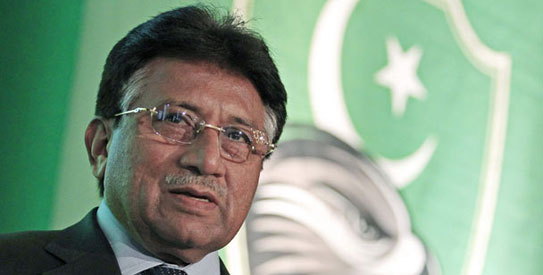ISLAMABAD: A Pakistani anti-terrorism court on Saturday issued an arrest warrant for former president Pervez Musharraf over the assassination of ex-prime minister Benazir Bhutto, a public prosecutor said.
Musharraf, who was president when Bhutto was killed in December 2007 in a gun and suicide bomb attack, is in self-imposed exile in London. He will not be going back to Pakistan for any court hearing, his spokesman said.
The former president and military ruler is alleged to have been part of a “broad conspiracy” to have his political rival killed before elections, though the exact nature of the charges against him was not immediately clear.
“Judge Rana Nisar Ahmad has issued non-bailable warrant for former President Pervez Musharraf and directed him to appear before the court on February 19,” special prosecutor Chaudhry Zulfiqar Ali told AFP.
He said that “a joint investigation team that had been formed to probe the assassination said in its report Musharraf had involvement in the case and was equally responsible”.
“The report said it was a broad conspiracy involving Pervez Musharraf, two police officials and terrorists,” Ali said after the closed-door hearing that took place in Rawalpindi's Adiala prison.
Asked what would happen if Musharraf did not appear in court, the prosecutor said: “We will see when the time comes.”
But Musharraf's spokesman in London told AFP that the former president would not comply with the warrant.
“No, he won't be going back for this hearing,” Fawad Chaudhry said, adding that the warrant was “totally ridiculous”.
Chaudhry ridiculed Pakistani accusations that Musharraf failed to provide adequate security for Bhutto.
“How can the president of a country be made responsible for the non-provision of security? It's totally ridiculous, you cannot pin criminal responsibility on a president for that,” Chaudhry said.
He insisted that Musharraf still planned to go back to Pakistan eventually to contest elections, adding: “His return to Pakistan will be a political decision.”In December, police arrested two senior police officers, Saud Aziz and Khurram Shahzad, for alleged dereliction of duty over the assassination of Bhutto after a court issued their arrest warrants.
Aziz, who was city police chief at the time of the killing, and Shahzad, another senior policeman in Rawalpindi, had been arrested for their “failure”to protect Bhutto.
Bhutto was killed after addressing an election campaign rally in the garrison city, near the capital Islamabad, on December 27, 2007.
Bhutto, who served two terms as prime minister, returned from exile two months before she was assassinated to stand for election.
Her widower, Asif Ali Zardari, led her Pakistan People's Party to election victory in February 2008 and is now president.
In April, a UN panel accused the government of failing to provide Bhutto with adequate protection and said investigations were hampered by intelligence agencies and other officials who impeded “an unfettered search for the truth”.
Former military leader Musharraf has lived in London since he was replaced by the elected Zardari.
At the time of Bhutto's death, Musharraf's government blamed the assassination on Pakistan's Taliban chief Baitullah Mehsud, who denied any involvement.
Mehsud was killed in a US drone attack in August 2009, one of the most high-profile casualties of the covert American campaign targeting Al-Qaeda and its allies in Pakistan's lawless tribal belt on the Afghan border.
Reacting strongly to the warrant, barrister Muhammad Ali Saif, secretary-general of Musharraf's All Pakistan Muslim League (APML) party, accused the government of not following legal procedures.
“I will rather call it unilateral as arrest warrant has been issued without hearing Pervez Musharraf,” Saif told AFP.
He added: “No list of questions had been sent to Musharraf by the government, which is trying to deflect public opinion from its own incompetency and failure to deliver to masses by wrongly implicating Musharraf in the case.
“The government is also trying to protect the real assassins by implicating people in the case who have no link whatsoever with it.” – AFP












































Dear visitor, the comments section is undergoing an overhaul and will return soon.